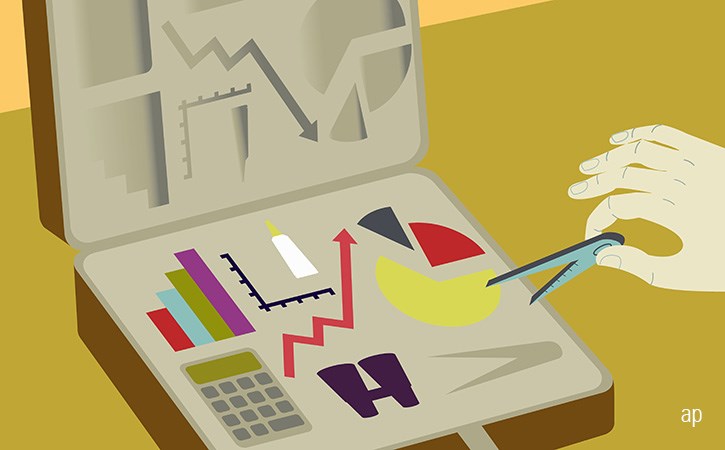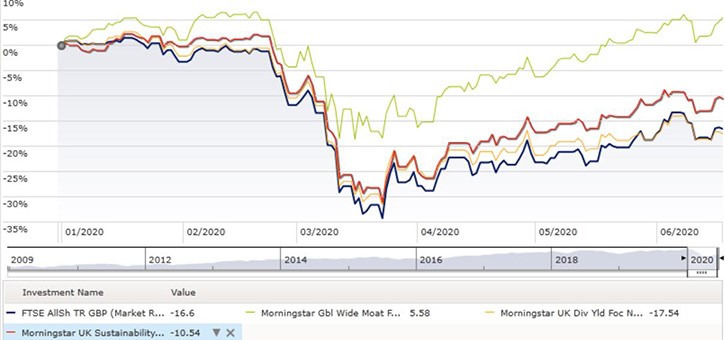
Morningstar provides thousands of indices to investors worldwide with a view to making easier the task of choosing which companies to invest in. We have looked in-depth at how a few of these indices are put together, which companies they invest in and how they have performed in some of the most challenging stock market conditions for decades.
The Wide Moat Focus Index
The concept of an economic moat is central to Morningstar’s philosophy that companies with competitive advantages are likely to outperform their rivals over the long term – and to reward investors handsomely along the way. The Morningstar Global Wide Moat Focus Index has returned 5.58% in 2020, beating wider market indices, which are still in negative territory after the coronavirus sell-off.
This 68-company index is stuffed full of world-leading businesses such as Microsoft (MSFT) and Google owner Alphabet (GOOG) and includes four UK listed companies, British American Tobacco (BATS), GlaxoSmithKline (GSK), Reckitt Benckiser (RB.) and Unilever (ULVR). These wide-moat names should be familiar to readers of our monthly list of high-yielding stocks.
Reckitt Benckiser is a staple of many UK equity income funds. As a maker of top household brands such as Dettol and Nurofen, the company's products have been in high demand since coronavirus outbreak. The near-2.5% yield is lower than many big dividend payers, but crucially the firm hasn’t cut its payout this year. In first quarter results, Reckitt revealed a near 33% jump in healthcare products on the same period last year, and a 12.8% increase in hygiene sales.
Sustainability Focus Indices
For UK investors, there are two indices with an ESG focus: Morningstar UK Sustainability, which holds 102 companies, and Morningstar UK Sustainability Dividend Focus, a more concentrated portfolio of just 25 dividend-paying firms.
Both indices look at high quality companies that score highly on environmental, social, and governance (ESG) investment criteria. Pharma giant GlaxoSmithkline has the biggest weighting in the Morningstar UK Sustainability Index, while Reckitt is the largest constituent in the dividend-focused index.

UK Dividend Focus Index
Sticking with dividends, the Morningstar UK Dividend Yield Focus index is part of the Morningstar Global Dividend Yield Focus Index Family. The index tracks the performance of a portfolio of high-quality, dividend-paying securities.
The index’s two largest holdings are AstraZeneca (AZN) and GlaxoSmithKline, both of which are in the race to find an effective coronavirus vaccine. Astra has already developed a vaccine with Oxford University, currently in its trial stage, and has agreed to supply 400 million doses to the EU. The firm's share price has soared on these developments, up more than 30% over one year.
Away from the large caps, the index also includes names that may be familiar to consumers but less so to income seekers: Games Workshop (GAW), Domino’s Pizza (DOM), and Moneysupermarket (MONY) have all done well during lockdown as the demand for fantasy games, pizzas and financial guidance has spiked.
Games Workshop started out as a niche hobby business but the success of the game Warhammer has helped propel the firm to a £2 billion valuation - shares are up 33% this year as more people spend time on hobbies at home, and have been on a tear since 2016, surging from £5 to £80 in just four years, a staggering 1,500% gain.
How Can I Invest?
There are exchange-traded funds available built around the Morningstar indices such as the Lyxor Core Morningstar UK ETF (based on the Morningstar UK index) and VanEck Vectors Morningstar Developed Markets Dividends Leaders ETF (based on the Morningstar Large Cap Dividend Leaders index). For many investors, however, the indices will simply provide much-needed inspiration for their portfolios, helping to whittle down thousands of potential stocks across the globe based on the characteristics that are most important to you.
One of the biggest attractions of using these indices as a template is that they do much of the technical legwork for you. One common element of these index screens, for example, is something called distance to default, a measure of a company's financial health that is very important for dividend indices. This gauges the likelihood that a company’s assets will fall below the value of its debt.
As Morningstar's index strategist Dan Lefkovitz explains, stock market information is a key element in distance to default because share prices often provide clues about the financial state of a company.
"The market can sniff out financial deterioration long before the numbers show up in financial statements. So, for the purposes of index selection, we compare companies to their peers on the basis of distance to default and screen out companies that don't score well," he says.








.jpg)



















